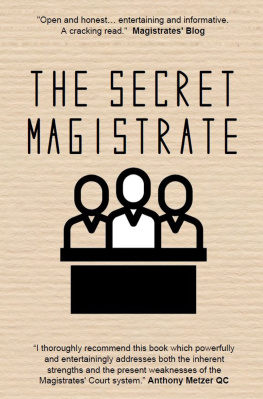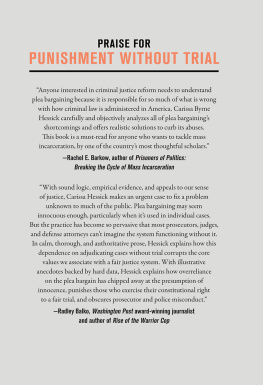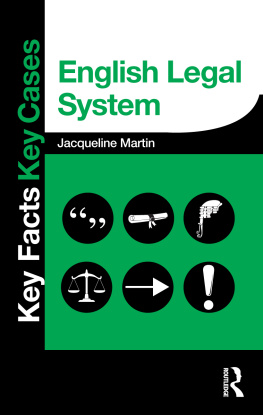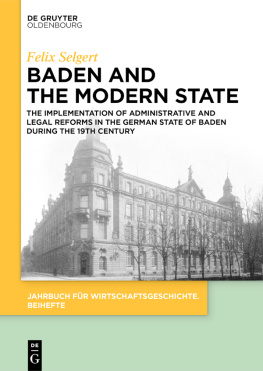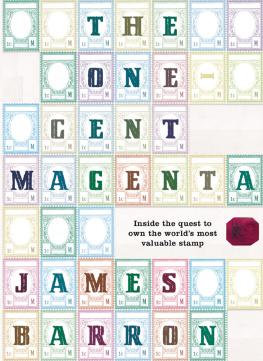The Jurymans Tale
THE MAGISTRATES TALE
Trevor Grove

First published 2002
This electronic edition published in 2012 by Bloomsbury Publishing Plc
Copyright 2002 by Trevor Grove
The moral right of the author has been asserted
All rights reserved
You may not copy, distribute, transmit, reproduce or otherwise make available this publication (or any part of it) in any form, or by any means (including without limitation electronic, digital, optical, mechanical, photocopying, printing, recording or otherwise), without the prior written permission of the publisher. Any person who does any unauthorised act in relation to this publication may be liable to criminal prosecution and civil claims for damages
Bloomsbury Publishing Plc,
50 Bedford Square,
London, WC1B 3DP
A CIP catalogue record for this book is available from the British Library
ISBN 978 1 4088 3756 6
Visit www.bloomsbury.com to find out more about our authors and their books
You will find extracts, author interviews, author events and you can sign up for
newsletters to be the first to hear about our latest releases and special offers
Contents
My thanks to all those mentioned in the text who agreed to talk to me, including law lords, politicians, bench chairmen, justices clerks, legal advisers, lawyers, court officials and, in particular, fellow magistrates on my own and other benches. Prison, probation and YOT officers were also enormously helpful, wittingly or unwittingly. I hope I have reported them accurately.
My special gratitude to Harry Mawdsley, then Chairman of the Magistrates Association, for encouraging this project from the start and, along with Ann Moody, former chair of the Haringey Bench, and John Hajdu, JP, for reading the typescript and offering invaluable advice.
My thanks to Ronald Blythe and Penguin for letting me quote a sizeable chunk from Akenfield, and to Peter Milford of St Vincent College, Gosport, for letting me use his excellent mock trial.
Sir Robin Auld refused me an interview, on the grounds that he had turned down all other approaches from the media regarding his review of the criminal justice system but volunteered to write a foreword to this book instead. I could not have been more surprised and pleased.
by the Rt. Hon. Lord Justice Auld
The Magistrates Tale should not be regarded as a sequel to Trevor Groves The Jurymans Tale, though it is as compelling a story and as penetrating an analysis of our criminal justice process. This tale is of his odyssey in becoming, and two years novitiate as, a magistrate. It is an odyssey in which he chronicles, sometimes wryly, his growing affection for magistrates and respect for the justice they administer. For those who are magistrates, or who are otherwise involved in the system of summary justice, the story is as informative as it is engaging. For those who may be thinking of following him, and for the many who are unfamiliar with what magistrates do, his account is a highly readable and practical guide.
The magistracy of which Trevor Grove has become a member is a truly remarkable body of people. No other country in the world relies, as we do, on lay magistrates unpaid volunteers to administer the bulk of criminal justice. Magistrates Courts deal with about 95 per cent of all prosecuted cases. Magistrates, over 30,000 of them, sitting usually in panels of three, handle 91 per cent of that work, the balance being undertaken by professional magistrates, now called District Judges (Magistrates Courts). As he observes, the magistracy owes its longevity and vitality to its willingness to change and evolve with the times.
Trevor Groves experience of lay justice as exercised by a jury in partnership with a judge in the Crown Court led him to follow what he discovered was a well-worn path from juror to magistrate. It is plain from his account of his magisterial colleagues and the nature of his work that he considers the journey to have been worthwhile. Instead of the old stereotype of an authoritarian, largely middle-class and late-middle-aged male bench, he found it to be composed, in general, of a wide variety of men and women from all walks of life and ethnic backgrounds. All or most of them in his tale come over as persons with a refreshing humility and anxiety, not only to perform well forensically, but also, in the process, to do good for society and individuals in the cases before them. As his graphic accounts of many individual cases in his home court in Highgate and in other courts all over the country well illustrate, this is often a nigh impossible task given the social and family conditions that generate and nourish crime. Yet, despite local geographical and demographic differences and traditions, the picture is generally the same benches reasonably representative of the wide mix of the local communities from which they are drawn, taking their job seriously and trying to combine greater professionalism with practicality and common sense.
One of the most striking impressions of The Magistrates Tale is how much we now expect from magistrates, as unpaid volunteers, in the discharge of their civic duty. Criminal law, both substantively and in its rules of procedure and evidence, has become one of the most technical and difficult areas of the law to administer. Trevor Groves account reveals the extent of their task most of them without any legal qualifications. There are increasingly frequent training sessions some of them in the evenings and over weekends. There are many extra-curricular activities including attendance at periodic meetings of the local bench, speaking at schools and visiting probation centres, young offender institutions and prisons. Many magistrates also represent their bench on various inter-agency bodies, ever multiplying with the increasing governmental momentum towards joined-up working in the criminal justice system.
However, there is a danger if all this is pushed too far. Magistrates should not become so legally trained and give such time to their role as to adopt the mantle of quasi-professional judges. If they were to do so, it would be at the expense of their standing as ordinary members of the public bringing fairness and good sense to the job. In the legal and procedural technicalities of their work, they have the invaluable support and guidance of their justices chief clerks and legal advisers, another body of persons whose critical contribution to the success of the system runs like a thread through Trevor Groves account. Long may it remain that way.
records the comment of Lord Bingham, the Senior Law Lord, that if we were inventing the system from scratch we probably would not have come up with the lay magistracy, but that is not an argument against it. My work on the Criminal Courts Review led me firmly to the same view. I believe that Trevor Groves engaging and perceptive work should go a long way to securing a wider understanding of the immense value of magistrates to our system of criminal justice. The end of his tale is, I hope, a pointer to a happy ending to the imminent public debate and legislation on the matter, namely, preservation and strengthening of lay justice at all levels of trial. Certainly, both the story and the way he tells it encourage optimism.
Robin Auld
1
The Unprofessionals
You could say it is a remarkable act of faith in the good sense of ordinary people
For four oclock on a Monday afternoon, the Middlesex Guildhall Crown Court was unusually busy. Across Parliament Square in the House of Commons, MPs were in a state of excitement, having just concluded a ballot to elect a new Speaker. The tourists drifted like autumn leaves between the Houses of Parliament and Westminster Abbey, entangling themselves in the ribbons that marked the perpetual construction sites. Rush hour had begun, though it was impossible to tell: all day long the traffic around the square had been moving no faster than a glacier.
Next page

